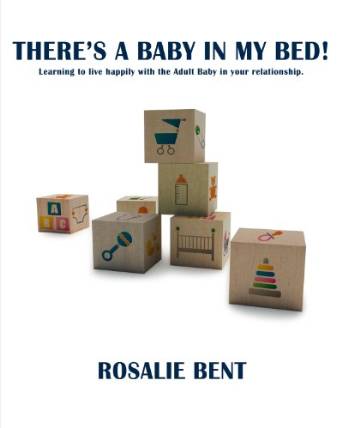Book by Rosalie Bent, review by BitterGrey

As a native English speaker, I might never appreciate how strange the world finds it that we drive on parkways, and park on driveways.
Rosalie Bent's book "There's a Baby in My Bed" was written by the spouse of an adult baby, for spouses of adult babies. Most well-researched material on AB/DLs was written by AB/DLs, so there is a need for a good book that expresses the concepts and conveys the experiences in ways that non-AB/DLs can relate to easily. Rosalie Bent's book has potential. However, the first edition is encumbered by terminology and novel assertions.
For example, it isn't rare for people to use "fetish" and "kink" interchangeably in casual conversation. This is problematic, because a fetish is technically a type of paraphilia, like infantilism and masochism. Paraphilias are specific medical conditions. Kinks are generally just odd sexual practices that a person might want to try or enjoy. In the book, Rosalie Bent uses the word 'fetish' where 'kink' would be a better match. This is especially true in sections contrasting infantilism and fetishes, where it seems more than reasonable to assume that formal definitions are being used. That is, it would be reasonable to assume that the author was contrasting one paraphilia to another, when the text is more consistent with a contrast of paraphilia and kink.
Let's consider Rosalie Bent's assertion that those with infantilism need to act on it every now and then, but that those with a fetish do not. This assertion is on page 18. As written, this assertion can cause confusion and disagreements. Paraphilias, such as infantilism and fetishism, aren't voluntary; that is one property that distinguishes them from kinks. Kinks can be developed like any other interest or taste. Later, the 'kinkster' might loose interest or move on to another kink.
A few pages prior, Rosalie Bent asserted that infantilism forms before age 12 (puberty), and that fetishism forms after that. Repeating the above word replacement gives the statement that kinks can be differentiated from infantilism by onset age: After a certain age, new paraphilias aren't expected to surface, but tastes might shift to include new kinks. Survey results support this modified statement, but suggest that two years later (14) is a better cutoff.
By defining infantilism and fetishes (kinks) as mutually exclusive, the book omits the reality that those with paraphilias might also develop kinks. This explains the considerable overlap between adult baby and diaper lover populations without requiring a high co-morbidity between the rare conditions of infantilism and diaper fetishism. Because of this overlap, the combined acronym "AB/DL" is reasonable.
Of course, Rosalie Bent's fresh perspective does have some benefits. For example, she introduces the phrase "attachment object" to describe specific items of paraphernalia that help adult babies express and connect to an infantile role. This attachment is something that many adult babies are familiar with, so it isn't discussed. It can be difficult to explain, if only due to a lack of practice.
The new phrase can be used alongside the usual knowtions of "the clothes making the man" or of an actor's costume and props. These are applicable but possibly unclear. These items have also been confused as being "transitional objects", possibly resulting in an over-diagnosis of borderline personality disorder among adult babies. (To avoid this dangerous confusion, it must be stated clearly: In contrast to those suffering from borderline personality disorder, most AB/DLs have completed the 'transition' towards having a developed awareness of self, and so do not form bonds with new transitional objects.) The phrase "attachment object" describes tidily items that adult babies are attached to, but that also express and evoke a change in role.
Much of the criticism of this book might have been sparked by misunderstandings. When discussing Los Angeles, the distant listener will be thinking of the greater LA area, while the local listener will be thinking of the much smaller City of Los Angeles itself. Since we've discussed places near and far, we know to expect this. When discussing infantilism, we don't have this experience, and so won't know to watch for such misunderstandings. Currently, this book offers value but requires some semantic untangling. Unless the reader already has a background in the topic, this book's novel assertions and odd use of terminology could easily be confusing.
Do you have Questions, tips, suggestions, or other feedback?
|